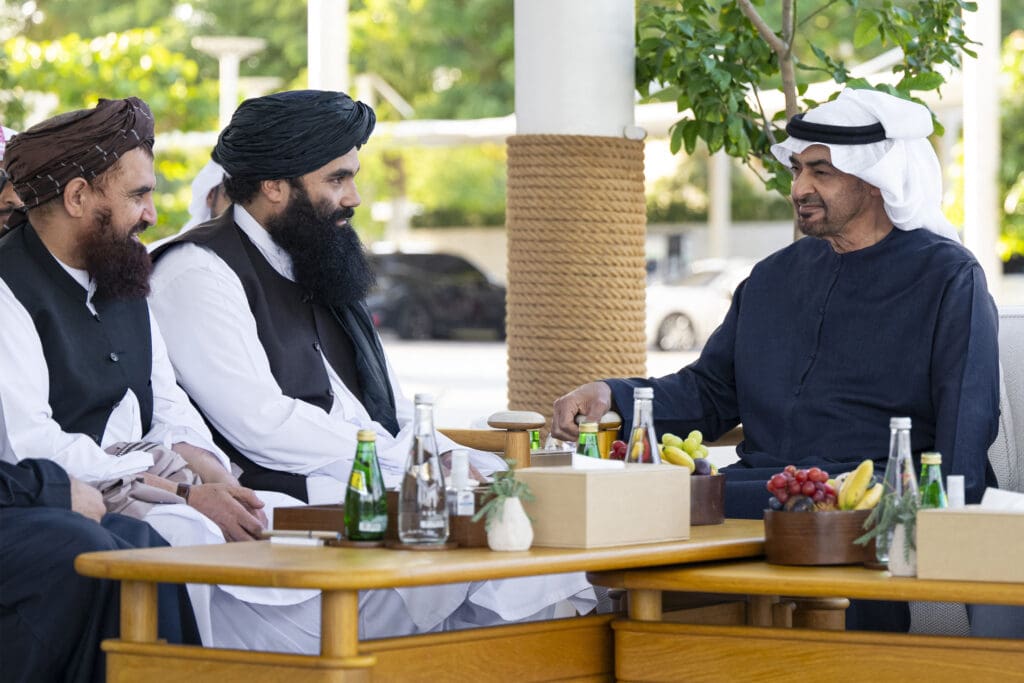For nearly a decade, international diplomacy concerning Afghanistan was mainly mediated by Qatar. Yet since the Taliban rolled into Kabul in August 2021, leading figures from the movement have made a string of high-profile visits to another key Gulf powerbroker, the United Arab Emirates. Their warm reception by the Emirati authorities suggests that Abu Dhabi is coming to rival Doha as a venue for diplomacy and mediation between world powers and Afghanistan’s new de facto rulers, who are seeking international legitimacy and to broaden outside influence in Afghan affairs.
The Emirati strategy fits into a broader pattern that has seen the UAE emerge as a proactive geopolitical actor in the Middle East and beyond, manifested in Abu Dhabi’s growing engagement in the political, economic and logistical spheres, particularly with states on the periphery of the Middle East. Afghanistan is a case in point.
The UAE first became involved in Afghanistan during the Afghan jihad against the Soviet Union in the 1980s, and was one of three countries to diplomatically recognize the first Taliban government in the 1990s. After September 11, 2001, and the American-led invasion of Afghanistan, the UAE recognized the new Afghan government and sent troops to train its security forces. However, Abu Dhabi was also eager to be the venue of later U.S.-Taliban negotiations, and did indeed host one round of these talks. Yet Taliban negotiators subsequently refused to reconvene in the UAE or Saudi Arabia, citing pressure from the leadership of both Gulf states to hold direct negotiations with the Afghan government. This effectively ended the limited Saudi and Emirati involvement in the Afghan peace process.
Since the Taliban takeover of Afghanistan, the Emirati government has adopted a pragmatic approach towards the country’s new rulers. The Taliban leadership has reciprocated, for example with its decision to accept the bid of the UAE state-linked GAAC Holding to run Afghanistan’s three main airports. It was notable that a rival, joint Qatari-Turkish bid fell through, due to a dispute with Türkiye over the creation of special security zones run solely by Turkish security contractors. The availability of the more politically feasible Emirati option further gave the Taliban an opportunity to rehabilitate ties with the Gulf state and also to balance Qatar’s role in the country.
The agreement also clearly signals that the Emirati government no longer views the Taliban as a pariah regime. While Abu Dhabi has remained critical of the Afghan administration’s repressive policies vis-à-vis women and their right to work and education, this has not prevented UAE-Taliban ties from developing further. In August 2024, for example, the UAE accepted the credentials of an ambassador from the Taliban, becoming only the second country in the world—after China—to do so.
The Taliban’s Quest for Legitimacy
This unique evolution of bilateral ties owes to a mix of geopolitical, economic and political motivations on both sides. Three years since its return to Kabul, the Taliban remains diplomatically isolated. It has been attempting to engage with multiple foreign actors in order to gain political legitimacy, refraining from showing hostility to any international actor besides Pakistan. A strong bilateral relationship with the UAE promises to bring political and economic dividends.
There is also a huge Afghan expatriate community in the UAE, which functions as a major source of the remittances that are vital to Afghanistan’s economy. Many hail from Taliban strongholds in Afghanistan’s south and southeast. The UAE had stopped issuing new visas to Afghans, but an agreement in June 2024 for resumption of visa issuance showed that the Taliban’s efforts to engage with the UAE were bearing fruit. Improved ties would also pave the way for the sizable Afghan business community based in the Emirates, with billions of assets, to start investing back home. Notably, this is in stark contrast to Qatar, which hosts few Afghans and has few economic linkages to the country.
The Taliban’s relationship with the UAE is somewhat complicated by a power struggle between different factions of the movement. The group’s Kandahar-based Supreme Leader, Mullah Haibatullah Akhundzada, has clashed with rivals in Kabul, notably Interior Minister Sirajuddin Haqqani, who is also head of the semi-autonomous Taliban faction known as the Haqqani Network. This tussle was reflected in the appointment of an Akhundzada ally as governor of Khost province, considered a Haqqani stronghold. Against this backdrop, Haqqani’s trips to meet top Emirati officials in the UAE—despite UN Security Council sanctions against him—reflect an attempt to increase his domestic political stature and to court external patrons. It is also worth mentioning that many Afghans in the UAE hail from the rural south-east of Afghanistan, where the Haqqanis are particularly strong.
It is also notable that the Emirati leadership had engaged with Sirajuddin’s father and the network’s founder, Jalaluddin Haqqani, during the Afghan Jihad. The group gradually developed a fundraising network in the UAE, but after 9/11 these activities took a downturn, and in 2014 Emirati authorities blacklisted the group. Nevertheless, the Taliban’s current ambassador to the UAE is also a Haqqani, reflecting the personalized nature of these relationships.
Emirati Ambitions
From an Emirati perspective, this rather pragmatic engagement with the Taliban remains important for multiple reasons. Leveraging its economic clout and old ties, the UAE has already been able to gain considerable political capital in Afghanistan. Relationships with the Haqqanis and the group’s criticism of the Taliban’s hardline emir provides the UAE with a critical link to a pragmatic yet powerful entity within the Afghan government. Moreover, the Haqqanis are a faction that had not been on the radar of Qatar, which had facilitated negotiations between U.S. and the Taliban for the American exit from Afghanistan. The Emirati approach thus reflects an attempt to develop critical political and economic linkages that translate into diplomatic capital. This could position the UAE to reap political rent from these connections with local stakeholders, becoming a mediator for its western partners.
Ties with the Taliban also fit well within the UAE’s network-centric model of statecraft, through which it has sought to develop ties with state actors despite their political and ideological differences. Afghanistan remains a critical hub for all sorts of connections with Central Asia, and any meaningful attempt to engage with that region is incomplete without a foothold in the country. The Emirati logistics giant DP World has already partnered with the Pakistani state-owned National Logistics Corporation (NLC) to dispatch commercial goods from the southern port city of Karachi to Central Asia. Emirati relationships with Taliban functionaries could help ensure the smooth functioning of this trade corridor.
The UAE has also positioned itself as a mediator for South Asian political engagement with the Taliban. This was evident when Afghanistan’s foreign minister chose Dubai for a meeting with his Indian counterpart in January 2025, reportedly facilitated by the Emirati authorities. There have also been reports that the UAE is trying to mediate between the Taliban and Pakistan, who remain at odds due to the presence of Taliban-inspired Tehreek-e-Taliban Pakistan (TTP) militants in Afghanistan and their increased attacks on Pakistani security forces.
The UAE’s engagement with Taliban officials raises Abu Dhabi’s strategic profile, at a time when only a handful of international stakeholders have any leverage inside Afghanistan. This may be of value to the Trump administration if it wants to open a separate channel of communication with the Haqqani network. That said, the Taliban’s supreme leader remains powerful, and his critics have not yet been able to mount a significant challenge to his rule or policies. This, in turn, may impose limitations on the UAE’s leverage.


